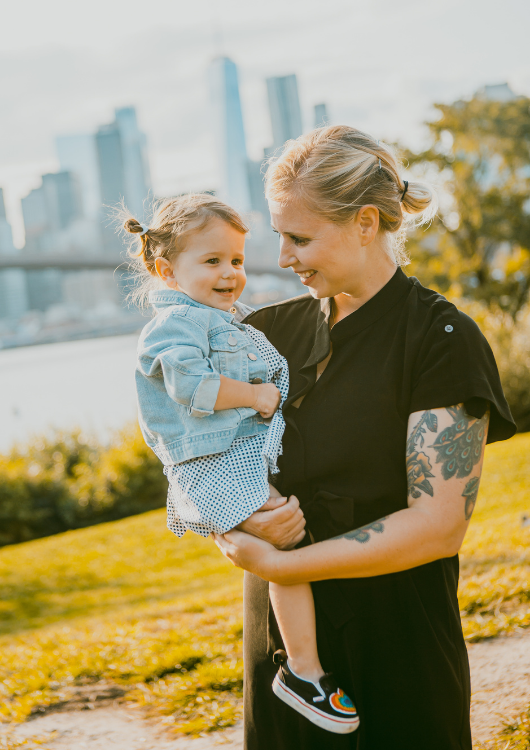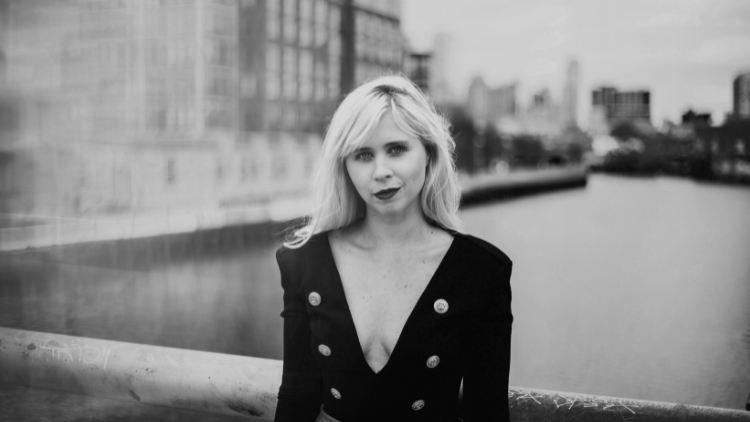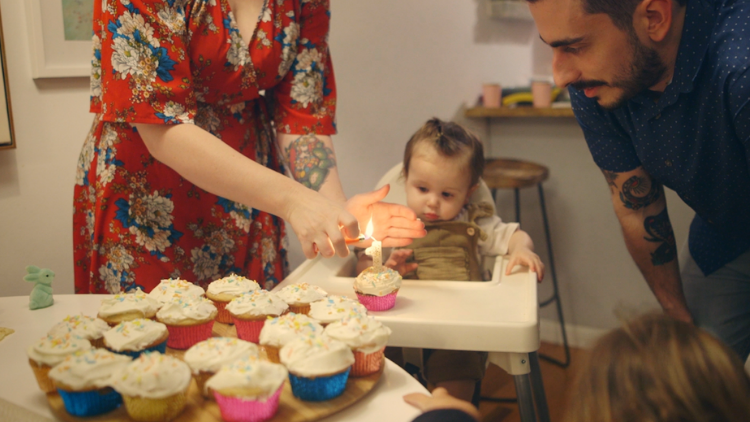June 23, 2021
What to Really Expect When Expecting: Meet Erin Bagwell, Documentary Filmmaker of Year One
By Emily Merrell
Having a baby is incredible. What no one openly talks about are the challenges that can come with it: identity, postpartum, depression and just plain survival. Award winning documentary filmmaker Erin Bagwell takes a deep dive into her own journey, analyzing the struggles of understanding motherhood and seeking outside help when it becomes too much.

SDS: Year One is an award winning documentary film about identity, postpartum depression and surviving the first year of motherhood. Did anything surprise you about The reaction of the film?
ERIN BAGWELL: I’ve been really humbled by the incredible response I’ve been getting from people after they watch the film. With the help of our premiere partner Motherly it’s been seen by over 145K people around the world. One of the coolest things I heard was from my friend Erica who said she overheard a group of moms talking about it on the 3rd Street playground in Park Slope, Brooklyn where I shot the film.
SDS: For all the new moms, expecting moms and seasoned professionals, let’s talk expectations versus reality about motherhood. How did your year one with Ginny differ from what you had expected? And are there any conversations you wish you had pre-baby to better manage expectations?
EB: I’m not sure anything can prepare you for being a parent, because every child is so different. I think for me, I would have liked more acknowledgement of how hard it is in the beginning – and that it’s okay for it to be hard, that it gets better and better. We don’t have a lot of personal parenting stories in the media, and I think it’s important to acknowledge the tough stuff alongside the joy. It’s a learning curve and a balance of highs and lows.

SDS: We don’t talk about postpartum depression enough, in the movie it looks like you found a community who supports and gets what you’re feeling. If you were to give advice to someone going through what you went through what would you tell them?
EB: PMADs can last up to three years if untreated, so if you aren’t feeling yourself and are feeling really overwhelmed, make sure you get help from a postpartum specialist who understands how to support you. PMADs is fully treatable and experienced by 1 in 5 mothers. Know you aren’t alone and you don’t have to do this alone. There is relief on the other side waiting for you, please get help.
SDS: This film is such a change from your original film, Dream, Girl. Did you know that Ginny would inspire such an impactful film and what’s next?
EB: I tried to produce a few different films after my first feature documentary Dream, Girl (a film about ambitious female entrepreneurs that premiered at The White House in 2016 during the Obama administration), but I wasn’t able to get anything off the ground. I was really inspired by the stories of mothers in Dream, Girl and always knew I wanted to make a film about them in some capacity, I just didn’t know it would be my story that would end up being told.
I started filming my daughter and I just to have as a keepsake, but once I saw the footage I was inspired to share some of the nuanced experiences I was grappling with as a new mother. I raised the money to pay my director of photography and we filmed my first year of motherhood for Year One.

SDS: There were so many incredible quotes throughout the film but this one really struck a chord. “Ever since becoming a mother myself I’ve been in awe of us. Of our power, our patience, and of our ability to carry on like we aren’t also carrying another world on our shoulders. In those early days it would ground me to remind myself my motherhood experience wasn’t unique. Women have been doing this since the beginning of time.” It reminds me of how we all need to write thank you notes to our own mothers and how flippant we are about being raised and cared for. Now that you’re past the 1 year mark, how does motherhood feel to you?
EB: My relationship with motherhood and my daughter is completely different these days. I’m still learning and growing as a parent but the stakes aren’t as high as keeping a newborn alive, and I give myself much more grace now to figure it out. My daughter Ginny is also a really bright and articulate toddler and I have an easier time relating to her now than when she was a baby. Thankfully, I’ve healed my PPD through individual and group therapy and I’m looking forward to growing my family in the years to come.
SDS: As a society, what can we do better to help advocate, protect and empower mothers?
EB: I think we need to start by demanding more from our elected officials. While mothers abroad blame their government for lack of support, American mothers blame themselves for not being able to keep all the balls in the air. I’d love to see Congress support “The Momnibus Act”, a comprehensive legislation addressing the Black maternal health crisis. We should also demand universal paid paternity leave (a sliding scale of 3 months to a year for both parents) and universal childcare.
Something you can do right now to help support new parents is just earnestly ask how they are doing. I heard about a million times “Enjoy every moment” before someone actually asked me how I was doing. Just being there to listen would mean the world.


